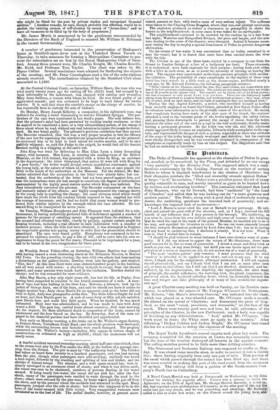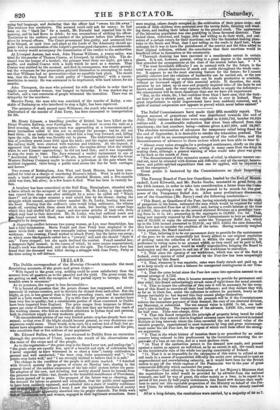ebe
The Duke of Newcastle has appeared as the champion of Dukes in gene ml, assailed, as he conceived, by the 7'imes, and defended by no,one except " very partially " by the Morning Post. The supposed attack was a semi- facetious commentary by the Leading Journal on the conduct of certain Dukes to whom it imputed interference in the election of- Members: but their champion combats the "blind and unworthy crusade against Dukes" at large; " as if," he exclaims, " Dukes were a peculiar genus devoid of every quality estimable in man, and merely intended. as game to be hunted down by envious and overbearing levellers." The journalist intimated that Lord John Manners, who sat for Newark, had been " cashiered " by "the Lord of Clumber," and added that he was looking out for "a more generous and modern patron." The Duke, along with a good deal of melancholy musing; denies the cashiering, questions the imputed lack of generosity, and ac- knowleges the imputed lack of modernness- " Lord J. Manners never owed his seat at Newark to my patronage. He soli- cited and eained the good-will of the electors; and, as I hops, recetved the full benefit of any influence that I may possess in the borough. His cashiering, a4 you term it, arose from his own delicate and high sense of honour; for, believing that he owed his seat to the uncle of the present Member, he resolved not to be in his way, and signified his intention to retire. No one can more sincerely lenient the bias towards Romanism professed by Lord John than I do; but as to having had any hand in cashiering him, I disclaim it utterly. It is not true. What is true is, that I wished him to remain.
" I should be glad to know in what instance I have ever shown a want of gene- rosity. If I did my utmost to oppose the return of Mr. Gladstone, there were good reasons for it, but no.want of generosity- I detest a mean and dirty trick as much as you can, or any man living; but until you can fasten upon use the per- petration of a mein or ungenerous act, do not accuse me of a want of generosity. "The more 'modern patron' only remains. I must presume that the word ' modern' is intended to be applied to my views, and not to my age. If to my views, I thank you for the compliment, although unintended. i will not express myself pharisaically, and say I thank God that I am not as some other men are, or even as this editor; but I will say that I am shocked, distressed, and hu- miliated, by the tergiversation, the duplicity, the ingratitude, the utter want of principle, the sordid selfishness, the wavering view, the pliant conscience, the perverted mind, the hardened unfeeling heart, which too miserably betoken the tone and temper and false philosophy of so many of this modern but degene- rate age."
A great Chartist camp meeting was held on Sunday, on the Newton race- course, to celebrate the return of Mr. Feargus O'Connor for Nottiugham. Mr. Roberts, the Miner's Attorney-General," was inducted into the chair, which was placed on a two-wheeled cart. Mr. O'Connor made a speech. He dilated on the spread of Chartism; and denounced the press of Eng- land, as the most " venal, prostitute, and damnable," on the face of the earth. There were twenty good men and true, he said, advocates of the principles of the Charter, in the new Parliament: such a body was capable of breaking up any Administration. " And," added Mr. O'Connor, " the work must be done; the Whigs must go again to the country." After ridiculing " Dickey Cobden and Jackey Bright," Mr. O'Connor sent round the hat for a collection to defray the expenses of the meeting.
The Royal Yacht Squadron's annual regatta took place last week. The company assembled for the occasion at Cowes was unusually numerous; but the state of the weather destroyed all interest in the aquatic contests. The sailing-matches proved to be little more than drifting-matches.
The Gravesend and Rochester Railway was reopened for traffic on Mon- day. It was closed some months since, in order to convert it into a double line; there having originally been only one pair of rails. That portion of the canal which passed through the tunnel has been filled up; and there was some trouble in making this part of the road sound, from the existence of springs. The railway will form a portion of the South-eastern Com pany's North line to Canterbury.
A Naval Court-Martial was held at Portsmouth on Wednesday, to try John Connor for striking his superior officer. Connor was a seaman on board the Agincourt; on the 27th of April last, Mr. George Herrick Burnaby. is mans] CS- det, bad reported some misbehaviour of Connor's; in the after part of the day the sailor had got very drunk, and he was grumbling and swearing; Mr. Burnaby called to him to make less noise; on this Connor struck the young man, also
using foal language, and declaring that the officer had " sworn his life away." The evidence was conclusive. The accused could only ask for mercy: he had been on the " black list " for a month, Mr. Burnaby had reported him in the morning, and he had flown to drink; he was unconscious of striking his officer. Testimony to the uniform good conduct of the prisoner before this offence was given by several officers. The Court pronounced him guilty, and sentenced him to be hanged, at such time and place as the Lords of the Admiralty should ap- point: but, in consideration of the culprit's previous good character, a recommenda- tion to mercy would accompany the transmission of the verdict to the authorities.
At Liverpool Assizes, last week, John Thomas Williams, a young sailor, was tried for the murder of Thomas Cearns, at Liverpool, by stabbing him. The de- ceased was the keeper of a brothel; the prisoner went there one night, got into a scuffle, and stabbed Cearns with a knife which he used as a seaman. That Cearns was stabbed by the accused, and died in consequence, was clearly proved; but the witnesses for the prosecution perjured themselves in attempting to make out that Williams had no provocation—that no squabble took place. The result was, that the Jury found the youth guilty of "manslaughter," with a recom- mendation to mercy. He was sentenced to be imprisoned, with hard labour, for six months.
John Thompson, the man who poisoned his wife at Carlisle in order that he might marry another woman, was hanged on Saturday. It was market-day at Carlisle, and a vast concourse of people witnessed the execution. There was no sympathy for the murderer.
Maurice Perry, the man who was convicted of the murder of Bailey, a con- stable of Bathampton who interfered to stop a fight, has been reprieved.
The sentence of death passed upon Willsmore, the youth who was convicted at Chelmsford of the murder of John Terry, has been commuted to transportation for life.
Mr. Henry Limner, a travelling jeweller of Bristol, has been killed on the Great Western Railway, near Farringdon. He was about to cross the rails at a level crossing, when an express-train was approaching at a tremendous speed: some bystanders called to him not to attempt the passage; but he did not heed them : in an instant the engine dashed him a long way forward, and, falling upon the rails, the body was literally cut to pieces. The unfortunate man had a box of jewellery worth some 3001. upon his back; and the engine and tender, and the railway itself, were strewed with watches and trinkets. At the inquest, it appeared that the deceased was quite sober: the engine-driver blew the whistle when he saw Linaner approaching; he did not heed this; and it was impossible to stop the train in time. The Jury returned a verdict tantamount to one of "Accidental death "; but added—" We are, however, of opinion that the Great Western Railway Company ought to station a policeman at the gate where the accident happened, there being a public road across the line for both carriages and horses.
Two women of Nottingham, Ann West and Sarah Henson, have been com- mitted for trial on a charge of murdering Henson's infant. West is said to have made a trade of procuring abortion: she attended Hanson, and a five-months child was born, but alive; in a few hours it died. West has been in custody be- fore.
A burglary has been committed at the Bull Ring, Birmingham, attended with a fierce attack on the occupant of the premises. Mr. St. Losky, a cigar-dealer, was roused from sleep soon after midnight by a noise: he called out " Who's there?" and at the same moment a man seized him by the throat: during the struggle which ensued, another robber assailed Mr. St. Losky, beating him over the head. Fearing that the sufferer's cries would bring assistance, the villains made off, carrying with them about 301. in cash, but leaving two carpet bags which they had stuffed full of cigars, and also some articles of their own dress
ioisew • h may lead to their detection. Mr. St. Losky, who had suffered much and found covered with blood, was taken to the hospital; his wounds are not ught:to be dangerous. A disgusting conflict between two young women, at Lye, near Stourbridge, has had a fatal termination. Maria Foxall and Jane Perry were employed in the same brick-field; and they were mutually jealous respecting the attentions of a workman. One evening, Foxall wished to attack Perry, but the latter ran away; on which some blackguards called her a "coward," and said she should "fight it out." Perry stopped; but she again declined the combat. Foxall assailed her; a derate fight ensued; in the course of which, by some means unaseertained, Foxall's neck was dislocated, and she died on the spot. The Coroner's Jury has found that the deceased was killed during a struggle with Jane Perry, Perry at the time acting in self-defence.



























 Previous page
Previous page